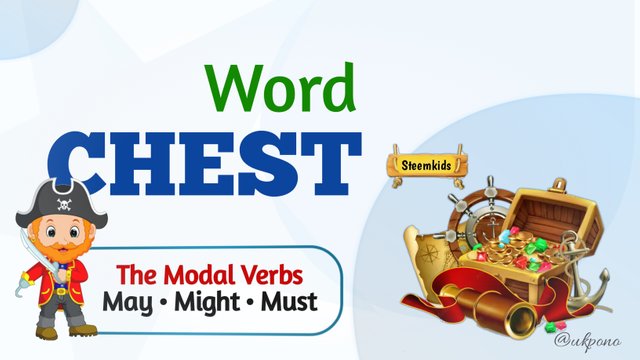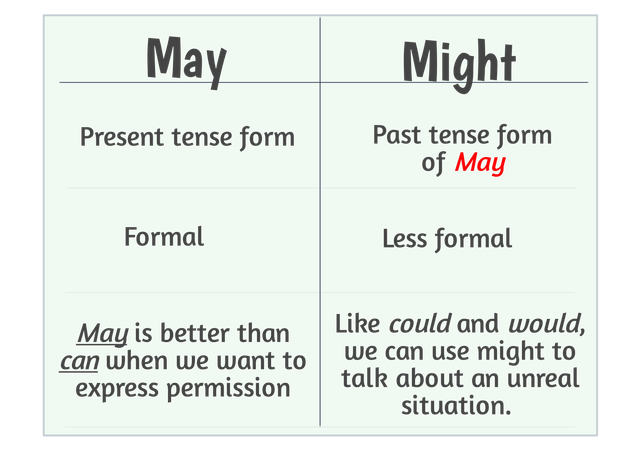
‘May’, ‘might’ and ‘must’ are modal auxiliary verbs that are used to express certainty (i.e. how certain a speaker is that something happened or did not happen). They can only be used to make polite requests, seek permission or give suggestions.
Table of Content
- Grammatical structure
- Possibility (present/past)
- Modal + have + past participle
- Polite requests and Permission
Modal verbs do not take "to" i.e.
Modal verb + infinitive. Example:
a. Nigerian students in federal varsities may grow old at home if the Federal government do not intervene timely. ✅
b. Nigerian students in federal varsities maytogrow old at home if the Federal government do not intervene timely. ❌Modals do not change their form. By this, it means that there do not inflect like other verbs. Example:
It/she/he mays...❌
...mighted...❌
...musting...❌
Now you understand these rules, let's look at how ‘may’, ‘might’ and ‘must’ are used in the English language.

May
‘May’ is used to express a possible situation or action. When a speaker uses it, s/he is about 50 per cent certain of the possibility of a situation or action.
Take for instance @ahbaz says:
- He is stuck in traffic.
(The degree of certainty is at 100 per cent which shows that she is very sure that he (whoever the person is) is stuck in traffic) - He may be stuck in traffic.
Here, Ahbaz is about 50% sure of this. It could be that the person is running late because there is a traffic jam or has probably forgotten about the meeting and is partying somewhere uptown.
Note that there is a subtle distinction between “may be” and “maybe”.

Might
Might is the past tense form of may. Example:
Teacher: Why is @imohmitch not in class today?
Response: He said he might be travelling to visit his aunt who lives in Spain today.
We should note that “might” can also be used to express possibility in the present.
- They might be right.
- @Ngoenyi might not be in the office this afternoon. (You know she goes for steem promotion, right? So lemme o)
| Diffentiating between May and Might |
|---|


Must
In possibility, ‘must’ is used when the speaker is ALMOST 100% per cent certain about a situation or action.
It uses the formula Modal + have + past participle. So we can have:
Titi aced the test. She must have worked so hard.
There are other possible reasons why Titi performed well in the test. She might have smuggled in a textbook, crammed the whole notes a week before or better still, read a night before the test. Who knows?
When you want to make polite requests or ask for permission, what are those go-to words you use? Let me guess...might, may and can, right?
It is common to say:
- Excuse me, ma'am. May I ask you a few questions?
- May I have a cup of water, please?
Note that ‘may’ is considered to be more formal than ‘might’ when asking for permissions or making polite requests.

- May and Might are used differently. One easy way to know which one to use is by looking at the tense of the sentence. If the sentence tense is in the present then use “may”, but if it is in the past then use “might”.
- Like could and would, we can use might to talk about an unreal situation. e.g. If I were a police officer, I might ensure that all offenders are tried and proven guilty in a court of law.
- We can also use ‘might’ when we are admitting that there is no choice in a situation, other than to do something. For example, Nigerian students affected by the industrial strike action might as well go ahead and marry because the Federal government and ASUU may not reach an agreement soon.
Another great lesson to learn from and I MUST learn it.
Really?😅 Let me get my bags ready
😅😹 Lemme o.
Okay since there's no activity.
What I have learnt today is numerous, when asking for request or permission it is nice to use MAY , I once asked my teacher, "CAN I come in" his response was are you ordering me? And he said if I can't get it right I won't enter, then I used "may" he then let me in😅
Downvoting a post can decrease pending rewards and make it less visible. Common reasons:
Submit
Reminds me of my days in high school. Lol
May and can have a similar meaning but the former is used to make polite requests while the latter makes requests sound kinda rude.
It is a British thing you know🥺
Downvoting a post can decrease pending rewards and make it less visible. Common reasons:
Submit
amazing lesson and yet i would love if you ask for a home work @ukpono
Downvoting a post can decrease pending rewards and make it less visible. Common reasons:
Submit
Thank you, Ikramullah.
We will be treating our last topic on modal verbs next week. So a very LONG activity will be given after the lesson.
Downvoting a post can decrease pending rewards and make it less visible. Common reasons:
Submit
i will look forward to it dear @ukpono 🌹🌹
Downvoting a post can decrease pending rewards and make it less visible. Common reasons:
Submit
Thank you
Downvoting a post can decrease pending rewards and make it less visible. Common reasons:
Submit
Muchas gracias.
Downvoting a post can decrease pending rewards and make it less visible. Common reasons:
Submit
amor devuelto
Downvoting a post can decrease pending rewards and make it less visible. Common reasons:
Submit
Wow
Question: Please can I say "If I were a police officer, I WOULD arrest suspected criminal and make sure I carry out proper investigation "
Can I use WOULD in this type of sentence?
Downvoting a post can decrease pending rewards and make it less visible. Common reasons:
Submit
It is grammatical.
Would like can is used when we imagine a situation — something that is not real.
The example you have given above is perfect.
Downvoting a post can decrease pending rewards and make it less visible. Common reasons:
Submit
Thank you tutor.
Downvoting a post can decrease pending rewards and make it less visible. Common reasons:
Submit